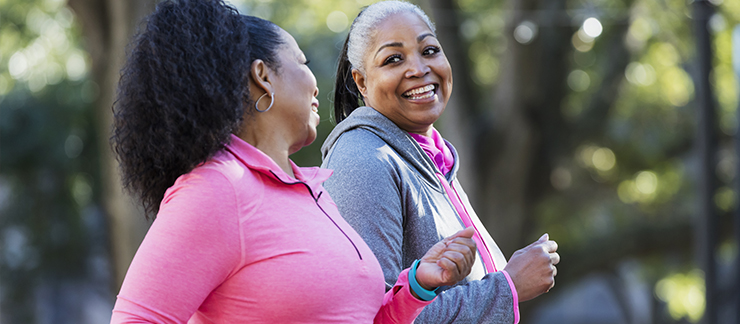
Exercise Benefits for Seniors Range from Chronic Disease Prevention to Boosting Immune System
Exercise for seniors just might be the key to the fountain of youth. Research reports that regular physical exercise improves both physical and cognitive functions. However, only 28 - 34% of adults ages 65 - 74 are physically active. While many maturing adults may stop or decrease exercise due to increasing physical restraints, exercise becomes even more important to improve strength, balance, and functionality. According to the American Academy of Family Physicians, almost all older people can benefit from some form of physical activity. Listed below are a few benefits that seniors gain from regular exercise.
Reduce Fall Risk
Exercise for seniors helps reduce the risk of falls, the leading cause of injury-related deaths for adults over the age of 65, as reported by the Centers for Disease Control. According to the National Council on Aging, one out of every four Americans aged 65 and older falls every year. Failure to engage in even mild exercise on a regular basis results in reduced muscle strength, decreased bone mass, and loss of balance and coordination - all factors contributing to falls and bone breaks that reduce mobility and independence. Tufts University research reports that strength training can dramatically reduce bone mass loss, restore bones, and contribute to better balance and fewer fractures.
Prevent Chronic Disease
The National Council on Aging reports that 91% of adults aged 65 or older have at least 1 chronic condition. Lack of exercise contributes to chronic disease as it can lead to significant weight gain and increases in belly fat that increase the risk of type 2 diabetes and heart disease. By lowering blood pressure and blood sugar levels while at the same time boosting good HDL cholesterol and blood circulation, regular exercise can avoid or reduce the chance of seniors having chronic diseases.
Increase Cognitive Abilities
Aging adults battle with the ability to think clearly and remember. In some cases, the elderly develop Alzheimer’s and other forms of dementia that dramatically restrict cognitive abilities. Research indicates that exercise improves cognition abilities by stimulating the brain’s ability to maintain an old network connection while making new ones. Studies suggest that exercise helps stimulate chemicals in the brain that affect the growth of brain cells, particularly in the hippocampus, that is responsible for memory. The hippocampus is prone to decline as we age, leading to dementia. Aerobic exercise, such as brisk walking, is considered beneficial to cognitive health.
Boost Immune System
As we age, our immune systems slow, increasing the risk of illness. Exercise helps adults of any age maintain a healthy, stronger body that can defend itself against colds more easily. Those who exercise typically sleep better, also boosting the immune system. In addition, recovery from an illness takes less a toll on a healthier body. Just walking 30 minutes daily helps the immune system fight infection.
Build a Positive Attitude
Exercise helps improve mood while reducing anxiety and depression. As exercise is often a communal activity, seniors have an opportunity to socialize and interact with people. Exercise also provides a sense of accomplishment that improves a person’s self-esteem.
How Much Exercise?
Physical Activity Guidelines for Americans issued by the Department of Health and Human Services recommends that older adults engage in a combination of physical activities that focus on balance training, aerobic, and muscle-strengthening. If starting or renewing exercise after a long break, aging adults should consult with physicians who can recommend their level of physical activity.
While aging seniors typically cannot engage in the 150 minutes of recommended moderate-intensity aerobic exercise for most adults, they should remain physically activity within their limitations. Seniors must move more and sit less during the day to gain some health benefits.
Exercise for Seniors
Inactive seniors should start slow with short 5- to 10-minute intervals of moderate activity and gradually building exercise time and intensity. To gain the best benefits, seniors should engage in a planned, structured, and repetitive form of physical activity. The goal is to get the body moving as movement increases circulation and oxygen to the brain and other parts of the body.
- Swimming, walking, gardening, dancing or even climbing stairs are aerobic activities that are less jarring to the body.
- Yoga and tai chi are very effective for increasing balance. Or seniors can work on balance at home by holding onto a sturdy chair, standing on one foot, then the other for 10 seconds and repeating the routine 10 times.
- Bodyweight training exercises that help strengthen muscles can include chair squats, single-leg stands, wall pushups, and stair climbing. (Here are 14 Exercises for Seniors to Improve Strength and Balance)
- Seniors should engage in stretching exercises as simple as reaching over the head after aerobic or strength exercises to maintain flexibility. (Silver Sneakers outlines 7 Simple Moves for the Not-So-Flexible)
By finding fun, enjoyable activities and mixing them up, older adults are more inclined to participate on an ongoing basis.
Physically-Challenged Seniors
Seniors with limited physical abilities due to injuries or medical conditions may find exercise more challenging; however, physical activity is even more important to decrease the risk of illness, falls and weight gain. Exercise classes supervised by trained professionals are ideal for those with specific limitations as trainers can offer modifications to exercises.
Local YMCAs and senior centers are ideal locations for exercise programs for aging adults, especially those with special needs. Before beginning any new exercise routine, discuss a regime with a physician who can make proper recommendations.
Physical activity is important for adults of any age. For seniors, exercise can help them continue to live independently and maintain a higher quality of life. Enlist family and friends that can make exercise an enjoyable social activity for your aging parent. Just going for a short walk can make a difference for everyone.
» Read: How Inactive Lifestyles Add 8 Years to Biological Age.


